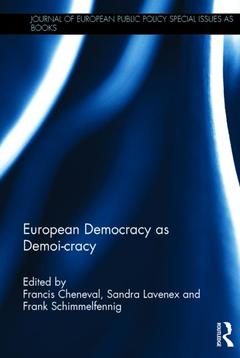European Democracy as Demoi-cracy Journal of European Public Policy Series
Coordonnateurs : Cheneval Francis, Lavenex Sandra, Schimmelfennig Frank

Whereas ?democracy? assumes a single demos or people, ?demoi-cracy? refers to democratic government and governance in a polity constituted by separate peoples. Since the European Union consists of many demoi with different collective identities, largely separate public spheres, and a predominantly national political infrastructure, demoi-cracy is an appropriate standard for the analysis and evaluation of democracy in the EU. In its vertical dimension, demoi-cracy is based on the equality and interaction of citizens? and statespeoples? representatives in the making of common policies. Horizontally, it seeks to balance equal transnational rights of citizens with national policy-making autonomy.
This volume offers exemplary studies exploring the potential for and the workings of demoi-cracy in the EU across a broad range of institutions and issues in both its vertical and horizontal dimensions. In particular, the contributions address the following questions: Is demoi-cracy relevant to citizen attitudes and public discourse on the EU?s legitimacy? How do national and supranational democratic institutions interact? Do the EU?s modes of governance, such as regulation through agencies, mutual recognition, and the open method of coordination, meet demoi-cratic expectations?
This book was originally published as a special issue of the Journal of European Public Policy.
1. Demoi-cracy in the European Union: Principles, Institutions, Policies 2. Demoi-cratic citizenship in Europe: an impossible ideal? 3. Stuck on the Rubicon? The Resonance of the Idea of Demoi-cracy in Media Debates on EU Legitimacy 4. Union Citizenship as a Demoi-cratic Institution: Increasing the EU’s Subjective Legitimacy through Supranational Citizenship? 5. Parliamentary Co-Evolution: National Parliamentary Reactions to the Empowerment of the European Parliament 6. European Union Agencies and their Management Boards: an Assessment of Accountability and Demoi-cratic Legitimacy 7. Squaring the Circle with Mutual Recognition? Demoi-cratic Governance in Practice 8. Open Method of Coordination for Demoi-cracy? Standards and Purposes 9. Epilogue: The Challenge of European Demoi-cratization
Francis Cheneval is Professor of Political Philosophy at the University of Zurich, Switzerland.
Sandra Lavenex is Professor of International Relations at the University of Lucerne, Switzerland.
Frank Schimmelfennig is Professor of European Politics at ETH Zurich, Switzerland.
Date de parution : 05-2015
15.6x23.4 cm
Date de parution : 06-2017
15.6x23.4 cm
Thème d’European Democracy as Demoi-cracy :
Mots-clés :
EU Mover; political autonomy; Journal Of European Public Policy; modes of governance; Demoi Cratic Legitimacy; transnational rights; European Public Policy; common policies; National Parliaments; political infrastructure; Peer Accountability; collective identities; OMC Process; European Union; Internal Political Efficacy; demoi; MB Member; democracy; Union Citizenship; Political Efficacy; Non-majoritarian Institutions; EU Institution; Eth Zurich; Broad Economic Policy Guidelines; Gradual Citizenship; EP Empowerment; Era; Political Membership; Vertical Accountability; Subjective Legitimacy; EU Agency; National Political System; EU Level Institution; EU’s Political System



